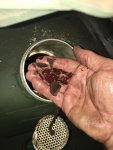I was driving my diesel tractor and it suddenly lost RPMs and died. I thought, maybe water in fuel. The fuel filter had collapsed and there was thick, very tar like build up in the bottom of the plastic filter can.
OKAY, I stumbled upon this and it makes more good common sense than anything else I have read on the subject:
This info excerpted from a thread titled "Asphaltene in Diesel Fuel" at a site called TDI Club, dated 23-February-2010
I posted this in someone's TDI101 fuel filter question but I wanted to start a new thread specific to this question. The fuel filter I changed in December on my 05 Golf (PD) had black fuel drain out of it. It turns out my in-tank lift pump was dead as well, so when I changed that out last...

forums.tdiclub.com
Post #13 by member ranger1
"This quote was taken from this site:
NOTE: Clicking on this link took me to a Vietnamese TV site, although the address bar showed the address I wanted.
As the link is obviously compromised, I removed it; though, I would have liked to see whatever other information that site may have had.
No need to click here anyway as the guy has already copy/pasted it below.
> Q: What are asphaltenes?
>
> A: Asphaltenes are tarry, organic particles that naturally occur in #2 diesel fuels.
Asphaltene particles are generally thought to be in the one-half to 2 micron range and are harmless to the injection system, as they are soft and deformable.
Concentrations of asphaltenes in diesel fuel vary widely and can increase through heat and fuel oxidation.
As these tiny particles pass through the filter media they tend to stick to individual fibers.
A build up of asphaltenes is the normal mechanism that plugs diesel fuel filters, not hard particles.
> Reference FMC TSB-95-1R1"
After studying and puzzling over this, I am in agreement and believe the information has hit the nail squarely on the head.
I like the part about Asphatlenes being much too soft to harm anything mechanical, such as the injection system.
I also agree about most fuel filter stop-up events being due to the sticky Asphaltene adherring to the filter media until enough gets stuck there to stop the flow of fuel.
I, myself, am currently dealing with a inch-thick layer of the stuff firmly stuck to the bottom of one of the three fuel tanks on my over-the-road truck.
Until I removed the fuel gauge port for entirely different reasons, I had no idea the gunk was even in there.
The truck and tank are 39-yrs-old; this may have been building in there for years.
I have not had a filter to plug in over fifteen years; so, the gunk must just cling to the bottom of the tank and stay there until otherwise molested.
I will say one thing ----- it sure is the stickiest stuff I have ever dealt with; and, whatever it gets on, it stays on.
I opened the bottom drain and hosed the tank out with a plain old water-hose and got more of it out than one would imagine.
I then poked the nozzle of my pressure washer in the gauge port; and, those areas where the washer could hit, it seemed to blast the gunk away to where I could see the tank bottom.
However, with a stiff/straight pressure-washer nozzle poked through maybe a 2-1/2" opening, I am very limited as to where I can hit.
I am in the process of rigging up two rotatable 90-degree attachments that I can adjust and orient to blast every square inch of the tank insides.
For the last few weeks, I have the gauge port blocked off with a block-off plate and the tank right at half full of water and several bottles of Dawn Ultra Platinum, hopefully sloshing violently around in there as I drive; however, since the truck rides like a dream and I also drive accordingly, the water might not be sloshing at all.
After reading that article/information, I am not going to obsess about the stuff.
I am going to get as much out as I can and then fill her full of fuel and drive the wheels off it.
One thing I have added that I didn't have before; my main biggest tank has always had a GoldenRod Filter/Separator; but, neither of the two smaller tanks did.
Now, I have GoldenRods first-in-line at each of the three tanks.
Nothing is going to get past a GoldenRod; I am a firm believer in them.
Now, properly equipped with one for each tank, if a bit of the gook happens to get caught up in a fuel line and happens to manage to cling to the GoldenRod Filter, if it does shut down the flow, I can simply switch to either of the other tanks and address the situation when I get back home.

 en.wikipedia.org
en.wikipedia.org

 en.wikipedia.org
en.wikipedia.org




